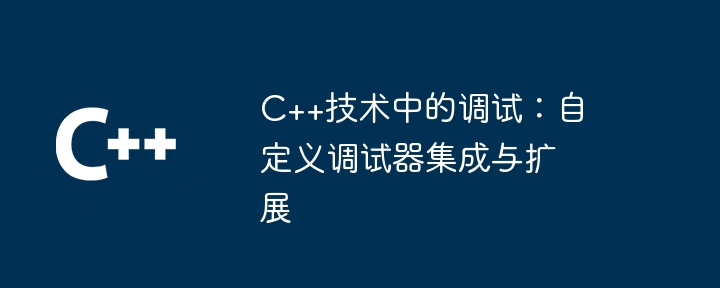
C Debugging technology can be enhanced through custom debugger integration and extension, including the following steps: Integrate a custom debugger: Create an adapter, load it into the application, configure the debugger to use it. Extended Debugger: Add custom commands and functionality through the extension mechanism to meet specific debugging needs. In actual combat, debugger extensions are used to create visual tools to help debug objects in the game world and improve debugging efficiency of complex game states.

Debugging in C Technology: Custom Debugger Integration and Extension
Preface
Debugging is an essential part of software development and helps to quickly identify and fix problems in the code. Debugging in C technology provides various mechanisms, including using standard tools such as GDB (GNU Debugger), but this still has limitations. Custom debugger integrations and extensions provide more advanced functionality, allowing developers to debug more efficiently.
Custom debugger integration
Integrating a custom debugger in C requires the following steps:
Code Example: Loading a Custom Debugger Adapter
#include <gdb/gdbserver.h>
int main() {
// 创建已实现 gdbserver::Target 接口的调试器适配器
MyDebuggerAdapter adapter;
gdbserver::GDBServer server("localhost", 1234);
// 加载适配器到服务器
server.add_target(std::unique_ptr<gdbserver::Target>(&adapter));
// 启动服务器以等待调试连接
server.run();
return 0;
}Debugger Extension
GDB and LLDB etc. The debugger provides an extension mechanism that allows developers to add custom commands and features. This can further enhance debugging capabilities to meet specific needs.
Code example: Creating a GDB extension to display custom data structures
class MyDataStructure {
// 数据成员和方法
};
void list_my_data_structure(gdb::CommandArgument &arg, FILE *out) {
// 从地址空间中检索 MyDataStructure 对象并打印它们的值
}
REGISTER_COMMAND_WITH_ARG(list_my_data_structure, ..., GDB_ARGV);Practical case
In game development, Debugger extensions have been used to create custom visualization tools that help debug complex game states and objects. For example, an extension can create an interactive 3D viewer that allows developers to visualize and interactively inspect objects in the game world.
Conclusion
Custom debugger integrations and extensions provide powerful mechanisms that enable developers to enhance C debugging capabilities. By creating custom debugger adapters and extensions, developers can address specific needs and increase debugging efficiency.
The above is the detailed content of Debugging in C++ technology: Custom debugger integration and extension. For more information, please follow other related articles on the PHP Chinese website!
 What are the differences between c++ and c language
What are the differences between c++ and c language
 Recommended learning order for c++ and python
Recommended learning order for c++ and python
 Cost-effectiveness analysis of learning python and c++
Cost-effectiveness analysis of learning python and c++
 Is c language the same as c++?
Is c language the same as c++?
 Which is better to learn first, c language or c++?
Which is better to learn first, c language or c++?
 The difference and connection between c language and c++
The difference and connection between c language and c++
 C++ software Chinese change tutorial
C++ software Chinese change tutorial
 Cost-effectiveness analysis of learning python, java and c++
Cost-effectiveness analysis of learning python, java and c++




